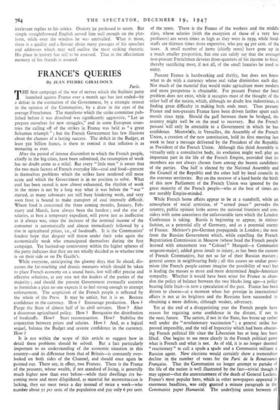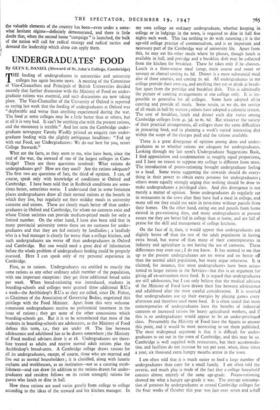FRANCE'S QUERIES
By JEAN PIERRE GIRAUDOUX
Paris.
THE first campaign of the war of nerves which the Stalinist party launched against France over a month ago has just ended—by a defeat in the estimation of the Government, by a strategic retreat in the opinion of the Communists, by a draw in the eyes of the average Frenchman. The manifesto which the strike committee pub-
lished before it was dissolved was significantly aggressive, " Let us prepare ourselves for new struggles," and in some European coun- tries the calling off of the strikes in France was held as "a great Schuman triumph " ; but the French Government has few illusions about the chances of a lasting success. The deficit in the Budget, at least 35o billion francs, is there to remind it that inflation is as menacing as ever.
After the period of intense discomfort to which the French people,
chiefly in the big cities, have been submitted, the resumption of work has no doubt come as a relief. But every " little man " is aware that the two main factors of French everyday life—coal and food—present in themselves problems which the strikes have rendered still more acute and which the Government is in no position to solve. What coal has been stored is now almost exhausted, the rhythm of work in the mines is not by a long way what it was before the " war " started, as many saboteurs are still busy hindering work, and very soon frost is bound to make transport of coal intensely difficult. Where food is concerned the three coming months, January, Feb- ruary and March, have always been the hardest ; and the rise of salaries, at best a temporary expedient, will prove just as ineffective as it always was, since the increase of the nominal income of the consumer is automatically and almost immediately followed by a rise in agricultural prices, i.e., of foodstuffs. It is the Communists' fondest hope that despair will throw under their yoke again the economically weak who emancipated themselves during the first campaign. Yet hushed-up controversy within the higher spheres of the party indicates that they are not wholly decided as to whether time is on their side or on De Gaulle's.
While everyone, anticipating the gloomy days that lie ahead, dis-
cusses the far-reaching and drastic measures which should be taken to place French economy on a sound basis, few will offer precise and effective solutions, at any rate not the leaders of the parties of the majority ; and should the present Government eventually contrive to formulate a plan no one expects it to feel strong enough to attempt enforcement. The scepticism of the French people is reflected by the whole of the Press. It may be unfair, but it is so. Restore confidence in the currency. How ? Encourage production. How ? (Purge the State of almost half of its civil servants. How ? Alter a disastrous agricultural policy. How ? Reorganise the distribution of foodstuffs. How? Start reconstruction. How? Stabilise the connection between prices and salaries. How ? And, as a logical sequel, balance the Budget and restore confidence in the currency. How ?
It is not within the scope of this article to suggest how in
detail these problems should be solved. But a fact particularly important to an understanding of the economic situation in this country—and its difference from that,of Britain—is constantly over- looked on both sides of the Channel, and should once again be pointed out. There are, in effect, two Frances. There is the France of the peasants, whose wealth, if not standard of:living, is generally much higher now than ever before—while their dwellings are be- coming more and more dilapidated, as material for reconstruction is lacking, they eat meat twice a day instead of twice a week—who number about 51 per cent. of the poptilation and pay only 6 per cent.
of the taxes. There is the France of the workers and the middle class, whose salaries (with the exception of those of a very few profiteers) are seven time as high as they were in 1939, while food- stuffs are thirteen times more expensive, who pay 94 per cent, of the taxes. A small number of items (chiefly rents) have gone up in a much smaller proportion, but one can safely say that the average! non-peasant Frenchman devotes three-quarters of his income to food, thereby sacrificing most, if not all, of the small luxuries he used to enjoy.
Peasant France is hardworking and thrifty, but does not know what to do with a currency whose real value diminishes each day.
Not much of the material that would make agriculture more modern and more prosperous is obtainable. For peasant France the food problem does not exist, while it occupies most of the thought of the other half of the nation, which, although no doubt less industrious, is finding great difficulty in making both ends meet. Thus peasant France and non-peasant France have been driven farther apart each month since 1939. Should the gulf between them be bridged, the country might well be on the road to recovery. But the French peasant will only be amenable to a Government in which he has confidence. Meanwhile, in Versailles, the Assembly of the French Union, a creation of the new constitution, held its first meeting last week to hear a message delivered by the President of the Republic as President of the French Union. Although this third Assembly is virtually only a consultative body, its evolution might well play an important part in the life of the French Empire, provided that its members are not always chosen from among the beaten candidates of the parties. One half is elected by the National Assembly and the Council of the Republic and the other half by local councils in the overseas territories. But on the morrow of a hard battle the birth of this new Parliament of the French Union was ignored by the great majority of the French people—who at the best of times are not notably Empire-minded.
While French home affairs appear to be at a standstill, while an atmosphere of social armistice, of " armed peace " pervades the country, public opinion looks across the national frontiers and con- siders with some uneasiness the unfavourable turn which the London Conference is taking. Russia is beginning to appear, in sinister fashion, as a potential ally of Germany, and as a potential enemy of France. Molotov's pro-German propaganda in London ; the note from the Russian Government which, while expelling the French Repatriation Commission in Moscow (whose head the French people learned with amazement was " Colonel " Marquie—a Communist sergeant-major), added gross insult to injury, as has been the custom of French Communists, but not so far of their Russian masters ; general unrest in neighbouring Italy ; all this causes no undue pessi- mism (the French people cannot imagine the possibility of war) but is leading the masses to more and more determined Anglo-American sympathy. Whether it would have been wiser for France to aban- don the policy of balance between the two blocks long ago—a policy bearing little fruit—is now a speculation of the past. France has been driven to choose—at a moment when her prestige in international affairs is not at its brightest and the Russians have succeeded in obtaining a more definite, although weaker, adversary.
Yet at the end of a disappointing year the French people have reason for regaining some confidence in the distant, if not in the near, future. The nation, if not in the State, has borne up rather well under the " revolutionary vaccination " ; a general strike has proved impossible, and the veil of hypocrisy which had been obscur- ing French political life since the Liberation has at long last been lifted. One begins to see more clearly in the French political game what is French and what is not. As of old, it is no longer deemed " reactionary " to call a spade a spade and a Communist militant a , Russian agent. New elections would certainly show a tremendous decline in the number of votes for the Parti de la Renaissance Franfaise. That the Communists no longer attempt to partake of the life of the nation is well illustrated by the fact—trivial though it may appear—that the announcement of the death of General Leclerc, France's most popular hero, which in other newspapers appeared in enormous headlines, was only granted a minute paragraph in the Communist paper Humanite. The underlying union between all the valuable elements of the country has been—even under a some- what hesitant regime—definitely demonstrated, and there is little doubt that, when the second home "campaign " is launched, the bulk of the nation will call for radical strategy and radical tactics and demand the leadership which alone can apply them.



































 Previous page
Previous page